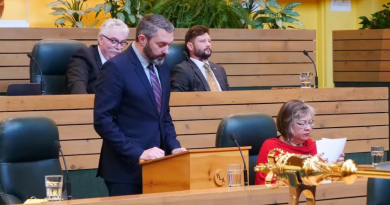Sanikiluaq wind project represents major Nunavut renewable energy policy shift

Project is expected to cut diesel fuel reliance in half
A lone windmill in Sanikiluaq, Nunavut, which is expected to produce enough power to cut the community’s reliance on diesel fuel by half, is all but a done deal.
On Sept. 29, the Qulliq Energy Corporation (QEC) and the Nunavut Nukkiksautiit Corporation (NNC) are expected to sign an agreement for the power corporation to buy the electricity generated from the windmill.
The signing is significant because it’s the first time the QEC will agree to buy electricity from an independent provider. But it also represents a major policy shift in Nunavut, paving the way for other renewable energy projects to be built and have their electricity sold to the territorial power corporation.
As CBC reported in November 2022, disagreements between NNC and QEC stalled the Sanikiluaq wind project — formally known as the Anuriqjuak Nukkiksautiit Project — because QEC never had a policy in place for how to purchase electricity from independent producers. The Sanikiluaq project has been in the works since 2016.

NNC director Heather Shilton said at the time QEC wouldn’t engage with her group because it lacked such a policy.
In a recent interview with CBC News, Shilton wouldn’t elaborate on the details of the agreement for the Sanikiluaq project until it’s signed next week. But she said QEC received ministerial approval in the fall of 2022 to accept applications under its independent power producers program.
“We applied under the program and we’ve been talking to them since that time about the project in Sanikiluaq,” Shilton said.
“We’ve been chatting with them for the last 10 to 12 months I would say, now that they have the approval to accept applications.”
QEC refused CBC’s request for an interview on the new policy direction because it wanted to issue a press release first.
Nunavut Premier P.J. Akeeagok, who is the minister responsible for QEC, also refused to comment on the ministerial decision behind QEC’s new policy until the signing ceremony in Sanikiluaq.
In its filing to the Nunavut Impact Review Board in 2021, NNC stressed the project (if successful) could be a catalyst for other communities in the territory.
“The project will demonstrate how community-scale renewable energy projects can be safely integrated with the local electrical grid. It will enhance the grid by providing a back-up source of energy when the diesel generators need to be offline,” NNC wrote in its filing.
“Nunavut needs to transition from diesel to sustainable energy systems. Renewable energy generation not only makes environmental sense, but also provides economic opportunities for Inuit.”
Advances in technology, and an ownership stake
The windmill is expected to produce one megawatt of power, with a one megawatt hour storage battery for the community of 1,000 people.
Shilton acknowledged some of the challenges behind a windmill, include icing and cold temperatures, but pointed to other successful projects across Inuit Nunangat.
“A lot of that has been mitigated in the last decade or two from the maturation of wind technology,” Shilton said. “You can get cold climate packages for wind turbines, you can get heating within the blades. So because of that, we’re able to offer a wind turbine in Arctic conditions for 12 months a year.”
Shilton said their data shows wind is strongest in the winter, and noted the project could potentially be paired with solar panels to harness energy in peak times year round.
The project, which also calls for a six-kilometre access road, is expected to create 15 local jobs during construction, and have three local jobs to operate the windmill once it’s completed.
“This is a big project. As you can imagine, we’re a have-not community,” said Ron Ladd, Sanikiluaq’s senior administrative officer, adding the Hamlet has an agreement with NNC for an ownership stake in the project.
Ladd said any revenue will go into a fund, where the community will then decide what to do with it.
“We’re not a decentralized community, so we don’t have those 50 or 60 good government jobs here. So with having an agreement put in place, that’s pretty much one of the only mechanisms we have to get some money.”
Related stories from around the North:
Canada: Bill requiring First Nations’ oil and gas development consent spiked in Yukon
Japan: Japan to ensure stable energy supply despite US sanctions on Russia’s Arctic LNG 2, Reuters
Norway: Norway’s oil minister: “We need new discoveries”, The Independent Barents Observer
Russia: More Russian Arctic oil via Murmansk redirects to India, The Independent Barents Observer
United States: Indigenous leaders divided over ANWR court ruling, Eye on the Arctic




The windmill project in Sanikiluaq, Nunavut, promises to drastically reduce the community’s dependence on diesel fuel. The agreement between Qulliq Energy Corporation (QEC) and Nunavut Nukkiksautiit Corporation (NNC) marks an important change in energy policy and brings job opportunities to the community. This is an important step forward for the use of renewable energy and helps protect the environment and create economic opportunities for the Inuit people. It is hoped this project will motivate other communities in Nunavut to implement similar renewable energy projects.
This is an important step forward for the use of renewable energy and helps protect the environment and create economic opportunities for the Inuit people. It is hoped this project will motivate other communities in Nunavut to implement similar renewable energy projects with Apkjani.